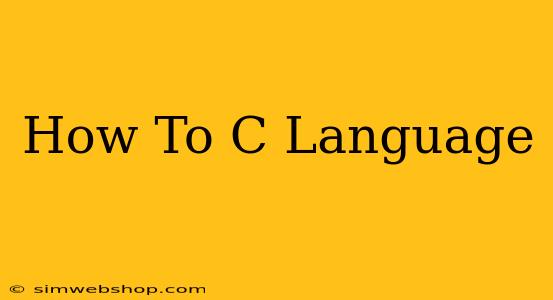So you want to learn C? Excellent choice! C is a powerful and foundational programming language, a stepping stone to understanding many other languages and systems. This guide will walk you through the essentials of learning C, from setting up your environment to tackling more advanced concepts.
Getting Started: Setting Up Your C Environment
Before you can write any C code, you'll need a compiler. A compiler translates your human-readable code into machine-readable instructions that your computer can understand and execute. Popular C compilers include:
- GCC (GNU Compiler Collection): A free, open-source compiler available for many operating systems, including Windows, macOS, and Linux. It's a robust and widely used choice for beginners and experienced programmers alike.
- Clang: Another free, open-source compiler known for its helpful error messages. It's a good alternative to GCC.
- Visual Studio: Microsoft's integrated development environment (IDE) includes a powerful C compiler. While more geared towards Windows development, it provides a comprehensive environment for coding.
Once you've chosen a compiler, you'll need a text editor or IDE to write your code. Many options exist, from simple text editors like Notepad++ (Windows) or Sublime Text (cross-platform) to full-fledged IDEs like Visual Studio Code (cross-platform) or Code::Blocks (cross-platform). The choice depends on your preference and experience.
The Fundamental Building Blocks of C
Let's dive into the core concepts of the C language:
1. Variables and Data Types
Variables are containers that store data. In C, you must declare the type of data a variable will hold before using it. Common data types include:
int: Stores integers (whole numbers).float: Stores single-precision floating-point numbers (numbers with decimal points).double: Stores double-precision floating-point numbers (higher precision thanfloat).char: Stores a single character.
2. Operators
Operators perform operations on variables and values. C provides a wide range of operators, including:
- Arithmetic operators:
+,-,*,/,%(modulo). - Assignment operators:
=,+=,-=,*=,/=. - Comparison operators:
==(equal to),!=(not equal to),>,<,>=,<=. - Logical operators:
&&(AND),||(OR),!(NOT).
3. Control Flow
Control flow statements dictate the order in which your code executes. Key control flow structures include:
ifstatements: Execute a block of code only if a condition is true.else ifstatements: Provide additional conditions to check if the initialifcondition is false.elsestatements: Execute a block of code if none of the precedingiforelse ifconditions are true.forloops: Repeat a block of code a specific number of times.whileloops: Repeat a block of code as long as a condition is true.do-whileloops: Similar towhileloops, but the code block executes at least once before the condition is checked.
4. Functions
Functions are reusable blocks of code that perform specific tasks. They help organize your code and make it more modular. A well-structured C program typically consists of several functions working together.
5. Arrays
Arrays store collections of data of the same type. They are accessed using an index, starting from 0.
6. Pointers
Pointers are variables that store memory addresses. They are a powerful but potentially tricky aspect of C, allowing for direct manipulation of memory. Understanding pointers is crucial for mastering more advanced C programming concepts.
7. Structures
Structures group together variables of different data types under a single name. They are useful for creating complex data structures.
Learning Resources
Numerous resources are available to help you learn C:
- Online tutorials: Websites like freeCodeCamp, Codecademy, and Khan Academy offer interactive C programming courses.
- Books: Many excellent books on C programming exist, catering to different levels of experience.
- Practice: The key to mastering C is consistent practice. Start with small programs and gradually work your way up to more complex projects.
Beyond the Basics
Once you've grasped the fundamentals, you can explore more advanced C topics such as:
- Memory management: Learn how to allocate and deallocate memory dynamically using
malloc,calloc,realloc, andfree. - File I/O: Learn how to read and write data to files.
- Data structures and algorithms: Study common data structures like linked lists, trees, and graphs, and learn algorithms to efficiently manipulate them.
Learning C takes time and effort, but the rewards are significant. With dedication and practice, you'll be able to write powerful and efficient programs. Good luck!

